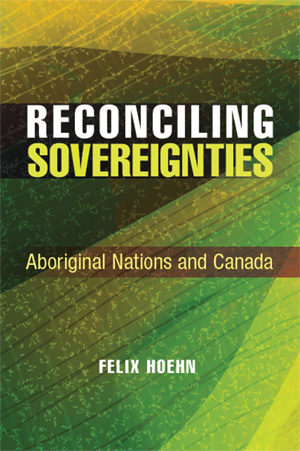Reconciling Sovereignties: Aboriginal Nations and Canada
 |
Winner of "Scholarly Writing"
|
Reconciling pre-existing Aboriginal sovereignty with de facto Crown sovereignty will not threaten the territory of Canada, nor will it result in a legal vacuum. Rather, it will facilitate the self-determination of Aboriginal peoples within Canada and strengthen Canada’s claim to territorial integrity in the eyes of international law.
In Reconciling Sovereignties, Felix Hoehn presents a persuasive case that the once unquestioned and uncritical acceptance of the Crown’s assertion of sovereignty over Aboriginal peoples and their territories is now being replaced by an emerging paradigm that recognizes the equality of Aboriginal and settler peoples and requires these peoples to negotiate how they will share sovereignty in Canada.
Hoehn concludes that the Supreme Court of Canada has taken us to the threshold of a new paradigm for Aboriginal law that (a) rejects the doctrines of discovery and terra nullius,
(b) accepts that Aboriginal sovereignty continues, and
(c) holds that only treaties can elevate the Crown from de facto sovereignty to a de jure sovereignty that is shared with Aboriginal peoples. The sovereignty paradigm will provide needed answers to the pressing moral and practical crises that plague the old paradigm, and it holds the greatest promise for reconciliation.
The text is current to William v. British Columbia (BCCA), June 27, 2012.
About the Author
Felix Hoehn, B.A. (Hons.), LL.B., LL.M., is an Assistant Professor at the College of Law, University of Saskatchewan.
Reviews
"This book is a must read for everyone interested in the reconciliation of Aboriginal and Crown sovereignty in Canadian law. It effectively demonstrates how colonial legal paradigms can be replaced by concepts that affirm the equality of Aboriginal nations within Canada’s constitution. In so doing, it takes the Supreme Court of Canada at its word when it directs the Crown to act honourably in its relations with Aboriginal peoples...."
- John Borrows, Robina Professor in Law, Policy and Society, University of Minnesota Law School
"… Hoehn challenges prevailing notions and presents a fresh assessment that rejects the Eurocentric doctrines of discovery and settlement. Relying on the Supreme Court’s groundbreaking decisions in Haida Nation and Taku River, he argues convincingly that the legitimacy of the Crown’s de facto sovereignty depends on treaties that reconcile Crown sovereignty and continuing Aboriginal sovereignty. This is precisely the kind of shift in thinking, based on equality of peoples, that needs to take place for Canada to move beyond its colonial past...."
- Kent McNeil, Professor, Osgoode Hall Law School
"Guided by the principle of the equality of peoples, Hoehn makes a compelling case for a paradigmatic shift in Aboriginal law.... Hoehn’s contribution lies not only in his careful articulation of the normative claim for recognition of Aboriginal sovereignty, but also in the descriptive power of shifting paradigms to explain the strained capacity of courts to reconcile, as they correctly say we must, pre-existing Aboriginal sovereignty with the assumed sovereignty of the Crown."
- Dr. Douglas C. Harris, Nathan T. Nemetz Chair in Legal History, Faculty of Law, University of British Columbia
Summary of Table of Contents
Introduction
- From Sovereignty to Aboriginal Title
- Early Respect for Aboriginal Sovereignty
- Sovereignty Is Denied; Aboriginal Title Is Born
- Aboriginal Title in Canada
- Aboriginal Title—A Subordinate Right
- A New Recognition of Sovereignty and Equality
- Sovereignty in Haida Nation and Taku River
- Sovereignty, Legitimacy, and the Act of State Doctrine
- The De Facto Doctrine and the Rule of Law
- The Duty to Consult and the Sovereignty Paradigm
- Aboriginal Sovereignty Today
- The Supreme Court and the Sovereignty Paradigm Since Haida Nation and Taku River
- Asserting Aboriginal Sovereignty
- The Emerging Sovereignty Paradigm
- Are They Really Opposing "Paradigms"?
- What's Wrong with the Old Paradigm?
- The Implications and Vision of a Sovereignty Paradigm
- Proof of Sovereignty
- Fiduciary Duties during Negotiations
- Existing Treaties
- Aboriginal Title or Ultimate Title?
- Third Party Rights
- Extinguishment of Aboriginal Rights
- Aboriginal Territories—Alienability and Internal Limits
- Aboriginal Rights, Aboriginal Jurisdiction, and the Role of the Courts
- Fiduciary Duties and Limitations on Sovereignty
- Sharing Sovereignty
Conclusion
